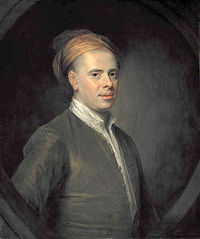Annotation:Magie's Tocher (1): Difference between revisions
(Created page with "__NOABC__ <div class="noprint"> <p><font face="sans-serif" size="4"> Back to [[{{BASEPAGENAME}}]] </font></p> </div> ---- {{#lst:{{PAGENAME}}|abc}} ---- <div style="page-break...") |
No edit summary |
||
| Line 10: | Line 10: | ||
<div style="text-align:justify;"> | <div style="text-align:justify;"> | ||
{{break}} | {{break}} | ||
'''MAGGIE'S TOCHER.''' AKA and see "[[Four Bare Legs in a Bed]]," "[[Four Bare Legs Together]]," "[[Raking Quality]]," "[[Trip to Marrowbone (A)]]." Scottish, Air and Jig (9/8 time). A Minor. Standard tuning (fiddle). AB. ''Tocher'' is the old Scots word for a dowery. The song, which relates the negotiations around Maggie's betrothal, was printed in Allan Ramsay's [http://en.wikipedia.org/wiki/Allan_Ramsay_%28poet%29] '''Tea Table Miscellany''' (1724-7, vol. III, Song 230), "To it's ain tune, | '''MAGGIE'S TOCHER.''' AKA and see "[[Four Bare Legs in a Bed]]," "[[Four Bare Legs Together]]," "[[Raking Quality]]," "[[Trip to Marrowbone (A)]]." Scottish, Air and Jig (9/8 time). A Minor. Standard tuning (fiddle). AB. ''Tocher'' is the old Scots word for a dowery. The song, which relates the negotiations around Maggie's betrothal, was printed in Allan Ramsay's [http://en.wikipedia.org/wiki/Allan_Ramsay_%28poet%29] '''Tea Table Miscellany''' (1724-7, vol. III, Song 230), "To it's ain tune." Ramsay put a letter 'Z' next to the tune in the index, denoting that it was old in his day. The tune was printed with words in London publisher William Thomson's '''Orpheus Caledonius''' of 1733 as "Maggie's Tocher" (Song 39). Ramsay indicated by printing a 'Z' on the page, that he considered it to be 'ancient'. John Glen finds it included in John Young's '''Dancing Master volume II''' (London, 1728), and rival London music publisher John Walsh included it under the title "[[Trip to Marrowbone (A)]]" in his '''Dancing Master, vol. 1'''). The song was also set by classical composer Franz Joseph Haydn. The lyric begins: | ||
[[File:ramsay.jpg|200px|thumb|left|Allan Ramsay (1686-1758)]] | [[File:ramsay.jpg|200px|thumb|left|Allan Ramsay (1686-1758)]] | ||
<blockquote> | <blockquote> | ||
Latest revision as of 02:30, 18 April 2024
X:1 T:Magie's [sic] Tocher [1] B:Allen Ramsay - Tea Table Miscellany (1724-27, Song 230) M:9/8 L:1/8 R:Air Z:AK/Fiddler's Companion K:Gdor G|BAB cBA BAG|^FGA A2G F=ED|BAB cBc d2d| DGG G2A BA||G|F2f fg=e f2 =e/d/|c2B A2G ^F=ED| D2g g2a bag|d2g g2a b2 a/g/|f2f f>g=e f=ed| c2B A2G ^F=ED|BAB cBc d2d|DGG G2A BA||
MAGGIE'S TOCHER. AKA and see "Four Bare Legs in a Bed," "Four Bare Legs Together," "Raking Quality," "Trip to Marrowbone (A)." Scottish, Air and Jig (9/8 time). A Minor. Standard tuning (fiddle). AB. Tocher is the old Scots word for a dowery. The song, which relates the negotiations around Maggie's betrothal, was printed in Allan Ramsay's [1] Tea Table Miscellany (1724-7, vol. III, Song 230), "To it's ain tune." Ramsay put a letter 'Z' next to the tune in the index, denoting that it was old in his day. The tune was printed with words in London publisher William Thomson's Orpheus Caledonius of 1733 as "Maggie's Tocher" (Song 39). Ramsay indicated by printing a 'Z' on the page, that he considered it to be 'ancient'. John Glen finds it included in John Young's Dancing Master volume II (London, 1728), and rival London music publisher John Walsh included it under the title "Trip to Marrowbone (A)" in his Dancing Master, vol. 1). The song was also set by classical composer Franz Joseph Haydn. The lyric begins:

The meal was dear short syne,
We buckl'd us a' the gither;
And Maggie was in her prime,
When Willie made courtship till her:
Twa pistals charg'd beguess,
To gie the courting shot;
And syne came ben the lass
Wi' swats drawn frae the but.
He first speer'd at the guidman,
And syne at Giles the mither,
An ye was gi's a bit land,
We'd buckle us e'en the gither.
The melody was in included in William Vickers' 1770 Northumbrian music manuscript collection under the title "Raking Quality, or, Four Bare Legs Together." Jack Campin finds an ancestral melody in Playford's Apollo's Banquet of 1669 under the title "A New Scottish Jig."
